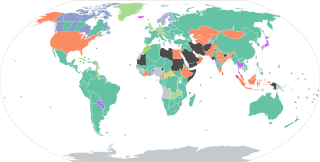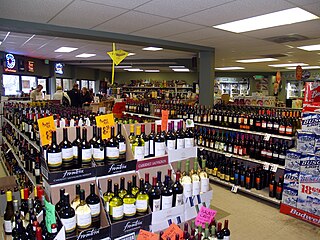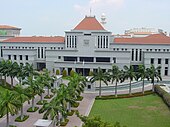
Low-alcohol beer is beer with little or no alcohol content that aims to reproduce the taste of beer while eliminating or reducing the inebriating effect, carbohydrates, and calories of regular alcoholic brews. Low-alcohol beers can come in different beer styles such as lagers, stouts, and ales. Low-alcohol beer is also known as light beer, non-alcoholic beer, small beer, small ale, or near-beer.

Prohibition is the act or practice of forbidding something by law; more particularly the term refers to the banning of the manufacture, storage, transportation, sale, possession, and consumption of alcoholic beverages. The word is also used to refer to a period of time during which such bans are enforced.

The legal drinking age is the minimum age at which a person can legally consume alcoholic beverages. The minimum age alcohol can be legally consumed can be different from the age when it can be purchased in some countries. These laws vary between countries and many laws have exemptions or special circumstances. Most laws apply only to drinking alcohol in public places with alcohol consumption in the home being mostly unregulated. Some countries also have different age limits for different types of alcohol drinks.

The Société des alcools du Québec is a provincial Crown corporation and monopoly in Quebec responsible for the trade of alcoholic beverages within the province.
The alcohol licensing laws of the United Kingdom regulate the sale and consumption of alcohol, with separate legislation for England, Wales, Northern Ireland and Scotland being passed, as necessary, by the UK parliament, the Senedd in Wales, the Northern Ireland Assembly, and the Scottish Parliament respectively.
BYOB or BYO is an initialism and acronym concerning alcohol or marijuana that means "bring your own bottle" or "bring your own booze", "bring your own beer", or for marijuana, "bring your own bud".

A liquor store is a retail business that predominantly sells prepackaged liquors, wine or beer, usually intended to be consumed off the store's premises. Depending on region and local idiom, they may also be called an off-licence, off-sale, bottle shop, bottle store or, colloquially, bottle-o, liquor store or other similar terms. A very limited number of jurisdictions have an alcohol monopoly. In US states that are alcoholic beverage control (ABC) states, the term ABC store may be used.
Alcoholic beverage control states, generally called control states, less often ABC states, are 17 states in the United States that have state monopoly over the wholesaling or retailing of some or all categories of alcoholic beverages, such as beer, wine, and distilled spirits.
The Washington State Liquor and Cannabis Board, formerly the Washington State Liquor Control Board, is an administrative agency of the State of Washington. The Liquor and Cannabis Board is part of the executive branch and reports to the Governor. The board's primary function is the licensing of on and off premises establishments which sell any type of alcohol, and the enforcement and education of the state's alcohol, tobacco, and cannabis laws.

A liquor license is a governmentally issued permit to sell, manufacture, store, or otherwise use alcoholic beverages.

Prohibition in Canada was a ban on alcoholic beverages that arose in various stages, from local municipal bans in the late 19th century, to provincial bans in the early 20th century, and national prohibition from 1918 to 1920. The relatively large and powerful beer and alcohol manufacturing sector, and the huge working class that purchased their products, failed to convince any of the governments to reverse their stance on prohibition. Most provinces repealed their bans in the 1920s, though alcohol was illegal in Prince Edward Island from 1901 to 1948. By comparison, Ontario's temperance act was in effect from 1916 to 1927.
Alcohol laws of Australia are laws that regulate the sale and consumption of alcoholic beverages. The legal drinking age is 18 throughout Australia. The minimum age for the purchase of alcoholic products in Australia is 18. A licence is required to produce or sell alcohol.

Alcohol has been consumed in New Zealand since the arrival of Europeans. The most popular alcoholic beverage is beer. The legal age to purchase alcohol is 18.

Alcohol laws are laws relating to manufacture, use, being under the influence of and sale of alcohol or alcoholic beverages. Common alcoholic beverages include beer, wine, (hard) cider, and distilled spirits. Definition of alcoholic beverage varies internationally, e.g., the United States defines an alcoholic beverage as "any beverage in liquid form which contains not less than one-half of one percent of alcohol by volume". Alcohol laws can restrict those who can produce alcohol, those who can buy it, when one can buy it, labelling and advertising, the types of alcoholic beverage that can be sold, where one can consume it, what activities are prohibited while intoxicated, and where one can buy it. In some cases, laws have even prohibited the use and sale of alcohol entirely.

Social customs and laws concerning drinking alcohol in public vary significantly around the world. "Public" in this context refers to outdoor spaces such as roads, walkways or parks, or in a moving vehicle. Drinking in bars, restaurants, stadiums, and other such establishments, for example, is not generally considered to be "in public" even though those establishments are open to the general public. In some countries, such as United States, Norway, Poland, India and Sri Lanka, as well as Muslim-majority countries where alcohol is legal, public drinking is almost universally condemned or outlawed, while in other countries, such as Portugal, Spain, Germany, the United Kingdom, New Zealand, Japan, Finland and China, public drinking is socially acceptable.

The serving of alcohol in the Commonwealth of Massachusetts is governed by the Alcoholic Beverages Control Commission (ABCC), which is responsible for issuing licenses and permits for all manufacturers, wholesalers and importers, out-of-state suppliers, brokers, salespeople, warehouses, planes, trains, ships, ship chandlers and vehicles transporting alcoholic beverages.
The 2013 Little India riot took place on 8 December 2013 after a fatal accident occurred at SST 21:23 at the junction of Race Course Road and Hampshire Road in Little India, Singapore, causing angry mobs of passers-by to attack the bus involved and emergency vehicles that had by then arrived at the location. About 300 migrant labourers were involved in the riot which lasted for around two hours. This was the second riot in post-independence Singapore, and the first in 44 years since the 1969 race riots.

Alcohol in Malaysia refers to the consumption, industry and laws of alcohol in the Southeast Asian country of Malaysia. Although Malaysia is a Muslim majority country, the country permits the selling of alcohol to non-Muslims. There are no nationwide alcohol bans being enforced in the country, with the exception of Kelantan and Terengganu which is only for Muslims. The Islamic party respects the rights of non-Muslims with non-Muslim establishments like Chinese restaurants and grocery shops being excluded from such bans. The federal territory of Kuala Lumpur has the highest alcohol consumption in the country, followed by the states of Sarawak in second place and Sabah in third place.












